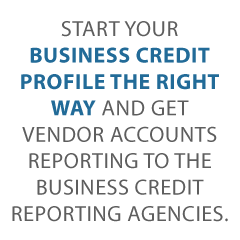Learn Where to Establish Business Credit and Celebrate as Your Business Takes Off!
Do you know where to establish business credit? When you are first beginning to establish company credit, your very first step should be vendor or trade credit. This is called the vendor credit tier. It is an almost magical way to get started. We can show you how to build business credit step by step.
Where to Establish Business Credit: It Starts with the Basics
No matter what, you want to enter into good credit practices. Hence this is everything from not borrowing too much, to paying your debts back promptly. And it also includes staying on good terms with your sources of credit. The absolute most vital thing you can possibly do, which will make the swiftest and greatest beneficial effect, is to pay off your invoices punctually or early. And develop a responsible and good payment record.
Are you asking, ‘do business credit cards build credit?’ They do! No doubt, this is the best way to build business credit.
Where to Establish Business Credit: Getting Started
You will have to launch a commercial credit profile and score with what are called starter vendors (also known as trade accounts or trade lines). Vendor credit tier vendors are ones who will give your small business initial credit. And they will do so even though your company has no credit, no score, or no trade lines.
Note that many of the more prominent and better known merchants like Staples or Walmart will not extend to you initial starter credit. So do not even try starting a credit application with them.
Here are three vendor accounts which you can use to begin to develop your commercial credit. This is where to establish business credit. And bear in mind: if you are declined in the beginning, keep trying!
These are excellent vendors to build business credit!
Where to Establish Business Credit: 1. Uline Shipping Supplies
Uline Shipping Supplies is a true starter vendor. You can find them online at www.uline.com.
This company offers for sale shipping, packing, and industrial supplies. These feature janitorial products and shipping boxes. And they also sell material handling products such as hand trucks and dollies. Most importantly, they report to Dun and Bradstreet and Experian.
For this reason, your business must have a D-U-N-S number before you start trying to get vendor credit with them. Uline will request two references and a bank reference. Your very first few orders might need to be prepaid in the beginning. This is to ensure that your small business can get approved for Net 30 terms.
This is the fastest way to build business credit. It’s a great way to get a build business credit card.
Where to Establish Business Credit: 2. Marathon
Check out starter vendor Marathon. Marathon Petroleum Company provides transportation fuels, asphalt, and specialty products throughout the United States. Their comprehensive product line supports commercial, industrial, and retail operations. This card reports to Dun & Bradstreet, Experian, and Equifax. Before applying for multiple accounts with WEX Fleet cards, make sure to have enough time in between applying so they don’t red-flag your account for fraud.
Your SSN is required for informational purposes. If concerned they will pull your personal credit talk to their credit department before applying. You can give a $500 deposit instead of using a personal guarantee, if in business less than a year. Apply online. Terms are Net 15. Get it here: www.marathonbrand.com.
Where to Establish Business Credit: Grainger Industrial Supply
Grainger Industrial Supply is also a true starter vendor. You can find them online at www.grainger.com. They sell safety equipment, plumbing supplies, and more, and they report to D&B. You will need a business license, EIN, and a D-U-N-S number.
For less than a $1000 credit limit they will approve nearly anybody with a business license.
It’s an awesome way to build business credit fast no personal guarantee.
These are some of our favorite companies that help build business credit.
https://creditsuite.wistia.com/medias/r54tn2c470?embedType=async&videoFoam=true&videoWidth=640
Where to Establish Business Credit: How to Do it
Need to know how to build your business credit?
Business credit is credit in a small business’s name. It doesn’t connect to an owner’s personal credit, not even if the owner is a sole proprietor and the only employee of the company.
Thus, an entrepreneur’s business and individual credit scores can be very different.
This is how to build your business credit.
The Benefits
Considering that small business credit is independent from consumer, it helps to protect a small business owner’s personal assets, in case of a lawsuit or business insolvency.
Also, with two separate credit scores, a small business owner can get two different cards from the same merchant. This effectively doubles purchasing power.
Another benefit is that even startup ventures can do this. Visiting a bank for a business loan can be a recipe for disappointment. But building small business credit, when done the right way, is a plan for success.
Consumer credit scores are dependent on payments but also other elements like credit use percentages.
But for business credit, the scores really only hinge on if a small business pays its debts in a timely manner.
The Process
How do you build business credit?
Building small business credit is a process, and it does not happen without effort. A business will need to actively work to build business credit.
That being said, it can be done readily and quickly, and it is much more efficient than building individual credit scores.
Vendors are a big aspect of this process.
Performing the steps out of order will cause repetitive rejections. No one can start at the top with business credit.
This is how you’re going to build business credit fast.
Business Fundability™
A business needs to be Fundable to lending institutions and merchants.
Therefore, a company will need a professional-looking web site and e-mail address. And it needs to have website hosting bought from a vendor like GoDaddy.
Also, business telephone numbers ought to have a listing on 411.com.
Likewise, the company telephone number should be toll-free (800 exchange or the like).
A company will also need a bank account dedicated only to it, and it must have every one of the licenses essential for running.
This is how to build credit for your business.
Licenses
If you’re asking ‘how do I build my business credit?’ – this is how.
These licenses all have to be in the specific, accurate name of the small business. And they need to have the same business address and phone numbers.
So note, that this means not just state licenses, but potentially also city licenses.
Working with the Internal Revenue Service
Visit the IRS website and obtain an EIN for the business. You can build business credit for free, but at least they’re totally free. Select a business entity such as corporation, LLC, etc.
A small business can get started as a sole proprietor. But they should switch to a form of corporation or an LLC.
This is in order to lessen risk. And it will maximize tax benefits.
A business entity will matter when it concerns taxes and liability in case of litigation. A sole proprietorship means the business owner is it when it comes to liability and tax obligations. Nobody else is responsible.
This is how to build business credit for an LLC.
Sole Proprietors Take Note
Are you asking, ‘how to build my business credit?’ – here’s how.
If you run a company as a sole proprietor, then at least be sure to file for a DBA. This is ‘doing business as’ status.
If you do not, then your personal name is the same as the company name. Hence, you can end up being directly accountable for all business debts.
But don’t look at a DBA filing as being anything beyond a steppingstone to incorporating.
Beginning the Business Credit Reporting Process
Begin at the D&B website and get a free D-U-N-S number. A D-U-N-S number is how D&B gets a business in their system, to generate a PAYDEX score. If there is no D-U-N-S number, then there is no record and no PAYDEX score.
Once in D&B’s system, search Equifax and Experian’s websites for the company. You can do this at www.creditsuite.com/reports. If there is a record with them, check it for accuracy and completeness. If there are no records with them, go to the next step in the process.
In this way, Experian and Equifax will have something to report on.
This is how you can tell yourself – build my business credit!
Vendor Credit
First you need to establish trade lines that report. This is also called vendor credit. Then you’ll have an established credit profile, and you’ll build business credit score.
And with an established business credit profile and score you can begin to get more credit.
These types of accounts tend to be for the things bought all the time, like marketing materials, shipping boxes, ink and toner, and office furniture.
But to start with, what is trade credit? These trade lines are credit issuers who will give you starter credit when you have none now. Terms are usually Net 30, instead of revolving.
So, if you get approval for $1,000 in vendor credit and use all of it, you will need to pay that money back in a set term, like within 30 days on a Net 30 account.
This is how to build business credit score.
Details
Net 30 accounts must be paid in full within 30 days. 60 accounts have to be paid fully within 60 days. In contrast to with revolving accounts, you have a set time when you must pay back what you borrowed or the credit you used.
Start your business credit profile the right way and get vendor accounts reporting to the business credit reporting agencies. As soon as that’s done, you can then use the credit.
Then pay back what you used, and the account is on report to Dun & Bradstreet, Experian, or Equifax.
This is how to build business credit in 30 days.
Vendor Credit – It Helps
Not every vendor can help in the same way true starter credit can. These are merchants that will grant an approval with nominal effort. You also need them to be reporting to one or more of the big three CRAs: Dun & Bradstreet, Equifax, and Experian.
For three excellent starter vendors, check above – Uline, Marathon, and Grainger.
Where to Establish Business Credit: Accounts That Don’t Report
Non-Reporting Trade Accounts can also be helpful. While you do want trade accounts to report to a minimum of one of the CRAs, a trade account which does not report can nonetheless be of some value.
You can always ask non-reporting accounts for trade references. Also credit accounts of any sort will help you to better even out business expenditures, therefore making financial planning easier.
Monitor Your Business Credit
Know what is happening with your credit. Make certain it is being reported and deal with any inaccuracies ASAP. Get in the habit of taking a look at credit reports. Dig into the particulars, not just the scores.
We can help you monitor business credit at Experian, Equifax, and D&B for a lot less than it would cost you at the CRAs.
Update Your Records
Update the data if there are mistakes or the info is incomplete. At D&B, you can do this at: https://iupdate.dnb.com/iUpdate/viewiUpdateHome.htm. For Experian, go here: www.experian.com/small-business/business-credit-information. And for Equifax, go here: www.equifax.com/business/small-business.
This is another way how to build credit for business.
Fix Your Business Credit
So, what’s all this monitoring for? It’s to contest any problems in your records. Errors in your credit report(s) can be corrected. But the CRAs often want you to dispute in a particular way.
Get your company’s PAYDEX report at: www.dnb.com/about-us/our-data.html. Get your company’s Experian report at: www.businesscreditfacts.com/pdp.aspx?pg=SearchForm. And get your Equifax business credit report at: www.equifax.com/business/credit-information.
Disputes
Disputing credit report inaccuracies usually means you precisely spell out any charges you contest.
Dispute your or your company’s Equifax report by following the instructions here.
You can dispute inaccuracies on your or your small business’s Experian report by following the instructions here: www.experian.com/small-business/business-credit-information.
And D&B’s PAYDEX Customer Service contact number is here: www.dandb.com/glossary/paydex.
This is another one of many ways to build business credit.
A Word about Business Credit Building
Always use credit responsibly! Never borrow more than what you can pay back. Keep track of balances and deadlines for repayments. Paying off punctually and fully will do more to elevate business credit scores than pretty much anything else.
Growing company credit pays off. Good business credit scores help a business get loans. Your lender knows the small business can pay its financial obligations. They recognize the company is bona fide.
The company’s EIN attaches to high scores and lenders won’t feel the need to require a personal guarantee.
Business credit is an asset which can help your business in years to come.
Where to Establish Business Credit: Takeaways
Getting merchant accounts for business credit means you are on your way to getting great small business credit. Once you have more than three vendor accounts and they are all reporting with the bigger business credit bureaus, then you can begin to access the retail credit tier. These three should quickly get you started.
And now you know where to establish business credit.


